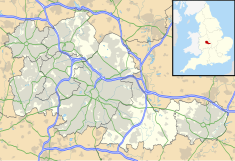Queen Elizabeth II Law Courts, Birmingham
| Queen Elizabeth II Law Courts, Birmingham | |
|---|---|
 Queen Elizabeth II Law Courts, Birmingham | |
| Location | Dalton Street, Birmingham |
| Coordinates | 52°28′58″N 1°53′32″W / 52.4829°N 1.8923°W |
| Built | 1987 |
| Architect | Property Services Agency |
| Architectural style(s) | Modernist style |
The Queen Elizabeth II Law Courts is a Crown Court venue, which deals with criminal cases, in Dalton Street, Birmingham, England.
History
[edit]Until the mid-1980s, all Crown Court cases were heard in the Victoria Law Courts in Corporation Street.[1][2] However, as the number of court cases in Birmingham grew, it became necessary to commission a more modern courthouse for criminal matters. The site selected by the Lord Chancellor's Department was a short remaining section of John Watt Street which had been severed by the construction of the James Watt Queensway.[3]
The new building was designed by Property Services Agency, built in red brick with terracotta dressings at a cost of £8.9 million,[4] and was completed in 1987.[5] The design involved an asymmetrical main frontage facing onto Dalton Street. The central section, which was projected forward, featured a full-height glass atrium to the right of centre. A carved terracotta Royal coat of arms was installed on the first floor to the right of the atrium. Short canted sections connected the central section to the wings. The whole structure was fenestrated by small square windows with architraves. Internally, the building was laid out to accommodate twelve courtrooms.[6]
A sculpture by Vincent Woropay carved in black Indian granite and depicting a series of busts of the engineer, James Watt, in the style of Egyptian obelisks and Native American totem poles and known as the "Wattilisk" was unveiled outside the building shortly after it opened.[7][8][9]
Notable cases have included the trial and conviction of three men, in June 2014, in connection with the 2013 English football match-fixing scandal,[10] the trial and conviction, in October 2014, of Barry Williams for shooting eight people in the towns of West Bromwich and Nuneaton,[11] and the trial and conviction, in August 2019, of Louise Porton for murdering her two children.[12][13]
References
[edit]- ^ Wallsgrove, Jon (2019). The Architecture of Law Courts. Paragon Publishing. p. 54. ISBN 978-1782227021.
- ^ Rudge, Ted; Joseph, Mac; Houghton, John (2010). Birmingham Up Town Through Time. Amberley Publishing. ISBN 978-1445626949.
- ^ "Ordnance Survey Map". 1914. Retrieved 23 January 2023.
- ^ "Capital Building Programme". Hansard. 26 January 1996. Retrieved 12 March 2023.
- ^ Mulcahy, Linda; Rowden, Emma (2019). The Democratic Courthouse: A Modern History of Design, Due Process and Dignity. Taylor and Francis. ISBN 978-0429558689.
- ^ "Birmingham". Ministry of Justice. Retrieved 23 January 2023.
- ^ "Wattilisk". Art UK. Retrieved 23 January 2023.
- ^ "Wattilisk". Vanderkrogt. Retrieved 23 January 2023.
- ^ "Wattilisk". University for the Creative Arts. Retrieved 23 January 2023.
- ^ "Match fixing: Two business men convicted of trying to fix lower league football matches". The Independent. 17 June 2014. Retrieved 23 January 2023.
- ^ "Replay: Serial killer Barry Williams stockpiled weapons under new identity - live updates from Birmingham Crown Court". Birmingham Mail. 6 October 2014. Retrieved 23 January 2023.
- ^ "Louise Porton jailed for life for murder of daughters". BBC News. 2 August 2019. Archived from the original on 13 September 2021. Retrieved 4 June 2022.
- ^ Taylor, Richard (2021). "The Mind of a Murderer: A Glimpse Into the Darkest Corners of the Human Psyche, from a Leading Forensic Psychiatrist". Headline. ISBN 978-1472268174.
